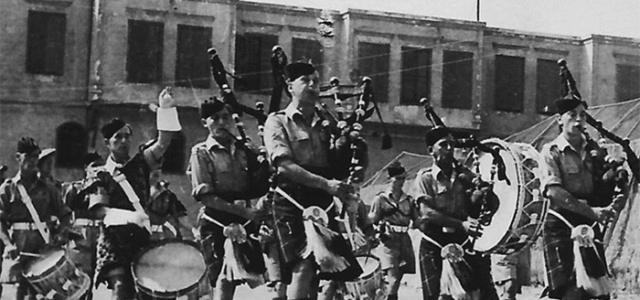
We are grateful for these two comprehensive responses to the request for tunes associated with the Highland Light Infantry regiment of the British Army.
They followed a request for assistance from Andrew Reid the piper for the regiment’s veterans association. The picture above shows the regiment pipe band parading in Cairo, Egypt, in 1946.
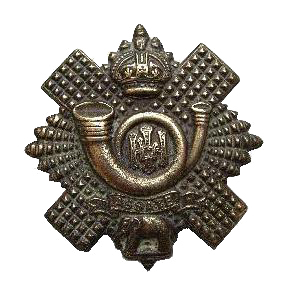
Reader David Livingstone: For what it’s worth, my 1932 potted history of line regiments lists HLI regimental tunes as:
Regimental Quick March: Whistle O’er The Lave O’t (Seann Triubhas)
Regimental Slow March: Garb of Old Gaul
Marching Column: Highland Laddie, Blue Bonnets
Return to Barracks: Scotland the Brave
Andrew may struggle to find duty tunes. I’m sure I read in the reminiscences of a post-war national serviceman in the HLI something to the effect that their life was governed by innumerable bugle calls from Reveille to Last Post.
I remember being surprised at the time it wasn’t pipe calls. If I can find the article I’ll pass it on.
[wds id=”2″]
Iain Duncan, former librarian for the RSPBA: I’ve listed a number of HLI associated tunes and hope these will be of assistance to Andrew.
If they turn out to be of interest to him I have copies of a few of the books including some of the more obscure ones, so I will probably be able to help with copies vis-à-vis:
1st Highland Light Infantry’s Farewell to Edinburgh: 4-part 6/8 march by P/M John Cameron in Edinburgh book 1, page 22.
3rd Highland Light Infantry: 2-part 6/8 march by P/M D Mathieson in Henderson Bagpipe Music Book, page 32.
3rd Highland Light Infantry Farewell to Warrenton, South Africa: 4-part 2/4 march by DA Campbell, Glendale, in Gray & Seaton’s book 1, page 16.
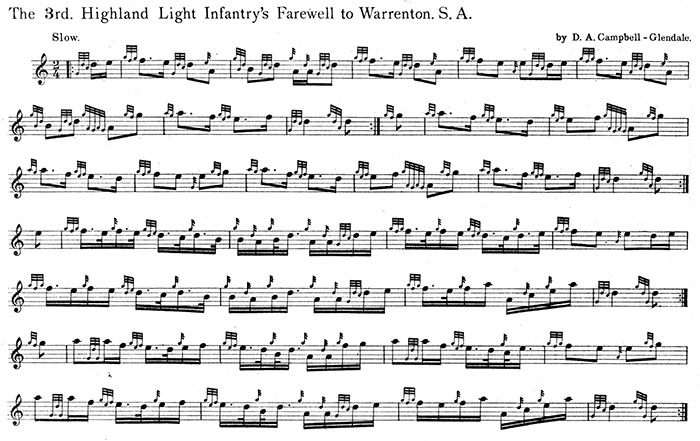
3rd Highland Light Infantry’s Welcome to Aldershot: 4-part 2/4 march by P/M D Mathieson in Henderson’s Bagpipe Music Book, page 33.
6th Highland Light Infantry’s Farewell to Gallipoli: 4-part 2/4 march by P/M FC MacKenzie in Logan’s Book 8, page 18.
7th Highland Light Infantry Farewell to Dunfermline: 2-part 4/4 march by P/M William Fergusson in Fergusson’s Collection, page 12.
10th Highland Light Infantry (HLI) Crossing the Rhine: 4-part 6/8 march by P/M Donald Shaw Ramsay BEM in Edcath Book 1, page 68.
71st Highland Light Infantry: 4-part 2/4 march by Hugh MacKay in David Glen’s Tutor, page 23.
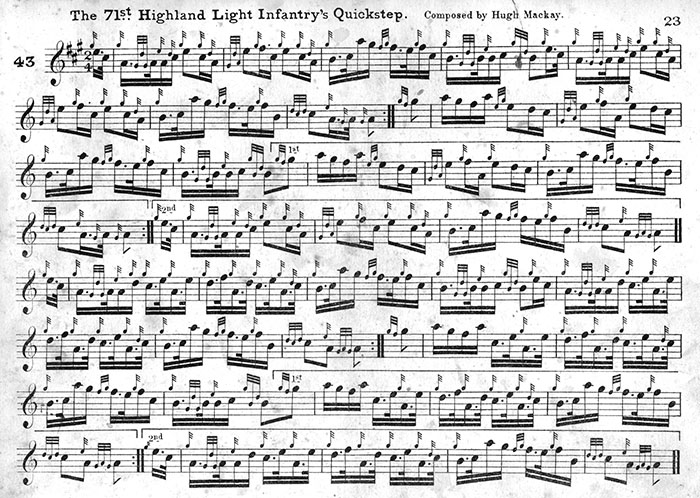
71st Highland Light Infantry Pipe Band: 4-part 2/4 march by P/M J Taylor in Logan’s Book 7, page 30.
71st Highland Light Infantry’s Welcome to Glasgow: composer unknown in Robert McKinnon’s Tutor, page 3.
More…
HLI History from the HLI Association’s website: The Childers Reforms of the British Army in 1881 resulted in the amalgamation of many infantry regiments, and the abandonment of the regimental numbering system.
The 71stHighland Light Infantry, and the 74th Highland became the 1st and 2nd Battalions of the The Highland Light Infantry.

The 1st Battalion HLI were stationed in Britain from 1881 to 1895, then in Malta from 1895 to 1898. 1st HLI served in Crete during rioting in 1898 before returning to Britain in 1899.
The Boer War 1899-1902 saw 1st HLI take part in the battles of Belmont (1899), Modder River (1899) and Magersfontein (1899), and numerous other engagements. In 1903 1st HLI left South Africa for Egypt (1903-1904) then Sudan (1904-1905), then to India (1905-1914).
The 2nd Battalion saw action at the Battle of Tel El Kebir in September 1882 during the Anglo-Egyptian War: Lieutenant William Edwards was awarded the Victoria Cross for his actions during the battle.
The 2nd Battalion was stationed in Britain from 1883, but moved to India the following year.

1897-1898 2nd HLI were part of the Malakand Field Force during operations on the North West Frontier of India. 2nd HLI remained in India from 1884 to 1900, when they returned to the British Isles, where they remained until 1914.
In 1898, Captain (The Honourable) Alexander Hore-Ruthven of the 3rd (Militia) Battalion HLI, saw service in the Sudan with the Egyptian Army under the command of Kitchener.
At Gedarif, on the 22nd of September, Captain Hore-Ruthven rescued a wounded Egyptian officer, carrying him safely back to the British squares under heavy fire and pursued by a large group of Dervishes. For this selfless action he was awarded the Victoria Cross.
- Find out more about the HLI and the regimental association here.
[wds id=”8″]







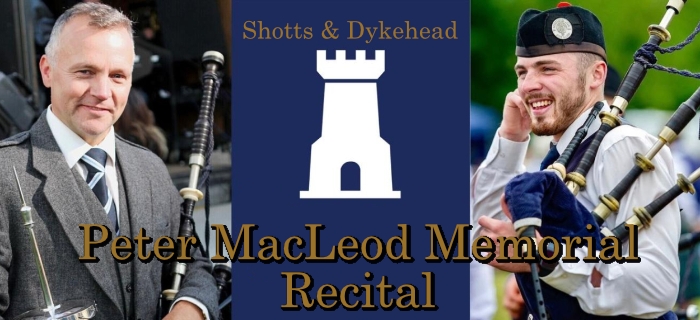









My paternal grandfather was KIA on 24 Apr 1917 while serving with the 14th Bn HLI and is buried in France. In researching his background and story, I did not find many tunes associated with the HLI. So, I set out to write my own. I am not a bagpiper, nor a writer or reader of music (let alone bagpipe music). I purchased a software program to ‘help’ me put my idea on paper and create a .wav file. I have called it “Awa’ Wi’ The HLI” – in essence my grandfather was conscripted and is still “Awa’ Wi’ The HLI”. I’d like some help to develop it further – into a complete tune. Can you advise how I might do this? If you’d like a copy of the ‘current’ .wav file, please ley me know.
I am sure someone will be able to help Tom. RW
My father was a Bandsman in the 2nd Battalion of the HLI. I have some original recordings of the HLI dance band on disc, metal sheet with wax coating. They are very fragile and I have wanted them conserved for many years. Please advise me asap.
Fiona Potter daughter of H.G. Rowland.
Dear Mrs Potter,
Can I suggest you have digital copies made? However I do not know of anyone with a facility for playing metal sheet wax coating recordings. Hopefully a reader will respond to your query with more precise assistance.
RW
Fiona, what you have is commonly known as an “acetate” disc. They were intended for short-term use, and as you say are very fragile, and can only be played a few times before they wear out.
To preserve the discs themselves, the best approach might be to consider donating them to a suitable sound archive, where they would be held in suitable conditions for long term storage and be available to future scholars. The School of Scottish Studies might be able to direct you.
To preserve the sound recording themselves, a specialist could make a digital copy of the record, which could be transferred to CD or other suitable medium. Every large city will have someone who does this.
if you’re also listing tunes with HLI connections in addition to regimental duty tunes, you might cast a glance at a book called “The Piper’s Delight” which was published in 1933 (ish) by a piper who served with the HLI through WW1 and was Pipe Major of 7th Bn HLI from 1920 to 1940. His name was Robert Reid. I think it’s a fairly safe bet that many of the tunes in the book will have been played by 7 HLI.
I’ve just seen this David. Thanks exceedingly for the pointer!